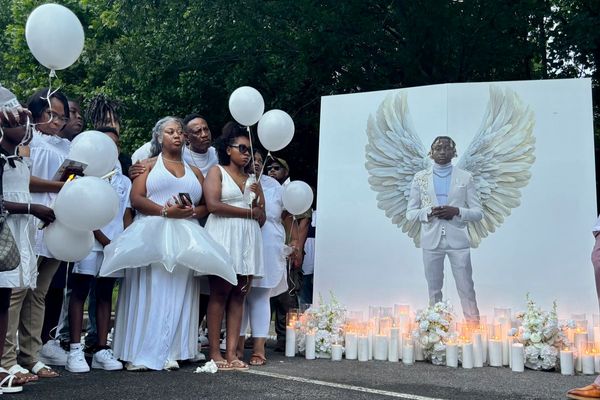
Here is an astringent, devastating and truly extraordinary film that is hard work to watch, but entirely worth it. Rojek probes the roots and fallen leaves of the Syrian civil war, a conflict the western media has practically forgotten as news of Ukraine and Gaza-Israel-Yemen dominates international reporting. Director Zayne Akyol, heard off-camera throughout, interviews members of Islamic State, now being held in high security prisons by the Syrian Democratic Forces, about their lives, with some recalling more innocent days when they hunted goldfinches to sell in markets or liked Canadian pop music. Many recount how they were recruited into IS by cells in local mosques in assorted countries – Germany, say, or Saudi Arabia – and came to have positions both high-ranking and menial in the organisation in the part of Syria with a dense Kurdish population.
In the film’s present, some are still unrepentant, believers that they fought honourably in a holy war; others see things differently and are riven with regrets. Some are women who recall their time of service to IS as the happiest days of their lives. In stately procession, each person speaks straight to the camera in almost disconcerting closeup, and however repugnant some of the things they say might be, it’s impossible to not recognise and see most of them as broken human beings.
In between these intensely intimate moments, cinematographers Nicolas Canniccioni and Arshia Shakiba deploy ultra high-resolution cameras on the ground and in the sky attached to drones. This footage shows the landscape in a way that’s often startlingly beautiful, even when we’re seeing mile after mile of smashed architecture or fires burning in fields that tiny figures put out slowly with sacks that they smack on the flames. There’s even a rather beautiful tracking aerial shot watching lights going off in a garden while a party rages. Elsewhere, a stylised blend of minimalist music and recorded sound pulses away and we see a cadre of female soldiers, members of the Kurdish Women’s Protection Unit forces, practicing combat manoeuvres, operating heavy artillery, and examining vehicles at checkpoints. Those in charge now keep a wary eye out for members of IS sleeper cells, ominously mentioned by the interviewees as still out there despite the coalition’s claims of victory.
Akyol was born in Kurdistan but moved to Quebec as a child; her acclaimed debut doc Gulistan, Land of Roses explored a very personal story about a family friend who raised Akyol and then ran away to join the PKK, the revolutionary Kurdistan Workers’ party. It’s not hard to see how this film grew naturally out of the previous one, even if the voices we hear here are primarily those of Islamic zealots rather than leftist warriors. Gender and misogyny is a palpable issue here but in a baseline sort of way – the point seems to be to listen hard to these prisoners’ stories and from there try to understand them. It’s a bit like a cinematic truth and reconciliation exercise, but with highly aestheticised visuals.
There’s no attempt to lay out some larger, explanatory narrative about the civil war; instead, Akyol presents a work that impacts the viewer on a visceral level thanks to top-notch craftsmanship. While everything onscreen impresses, I couldn’t help wondering what kind of dogged effort must have gone into getting permission from the current authorities to interview these subjects, a feat of film-making persistence that probably deserves an award in itself.
• Rojek is released on 19 January at Bertha DocHouse, London.







